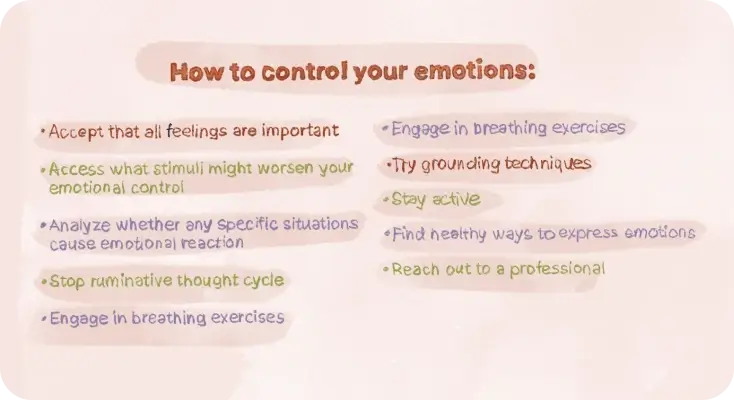You might experience challenges with controlling emotions for dozens of reasons. It can happen because of poor sleep, hormonal changes, lack of self-awareness or emotional support, unprocessed past experiences, or sudden life changes. Yet, the result is the same — the inability to handle emotions effectively might influence your quality of life.
In the article, we’ll talk about how emotional regulation affects your happiness, find out how to improve them and share strategies on how to handle your feelings in a more nurturing way.
What is emotional regulation & why controlling emotions is important
Emotional regulation is the ability to exert control over one’s own emotional state. [1] To put it simply, this is the skill of managing your feelings in a healthy and constructive way.
When we say that someone knows how to control emotions, it means that a person recognizes what they feel, understands the impact of different feelings, and responds appropriately according to the situation.
According to the American Journal of Lifestyle Medicine, emotional regulation significantly influences people’s lifestyle balance and overall well-being. [2] Here are the main benefits of strong emotional regulation skills as outlined in a study by the Journal of Adolescent Research [3]:
1. Emotional regulation contributes to rational thinking and decision-making
When emotions are too powerful, they can cloud judgment and lead to impulsive choices. Strong emotional regulation helps people pause, assess situations objectively, and make decisions based on logic.
2. Poor emotional control worsens life quality
“Bottling up emotions” as well as uncontrolled emotional responses may cause unnecessary arguments, work-related issues, or even long-term inner worries. In contrast, people with good ER experience fewer emotional outbursts and greater overall satisfaction with life.
3. Strong emotional regulation provides stability in life
The ability to control your emotions, both positive and negative, helps you stay balanced. The research states that constantly feeling positive emotions can create an unrealistic view of reality, making it difficult to stay focused on your objectives. Keeping your emotions in check allows you to stay grounded.
4. ER has relevance to current life stage and environment
When you enter a new stage, you experience new feelings that can seem unfamiliar. Without understanding how to handle emotions, you might turn to unhealthy habits. At the same time, learning to manage your emotions helps you navigate these experiences in a healthier way and make better choices.
Emily Mendez, M.S., Ed.S, shares professional insights about how emotional regulation may influence someone’s quality of life in an unobvious way, “Emotional regulation can influence a person’s life in a way that isn’t always obvious. For example, poor control of one’s emotions can lead to risky sexual behaviors. This can put a person at a higher risk for sexually transmitted diseases, which can lead to health problems.”
9 tips on how to control your emotions
If your reactions with others are causing frequent challenges, then you might be wondering, “How do I control my emotions?” If you find yourself facing the following challenges frequently, it may be time to take steps to better control your emotions.
- Frequent arguments in relationships
- Challenges in expressing emotions clearly with others
- Withdrawing from people when experiencing intense feelings
- Difficulty in apologizing or admitting wrongs
- Inability to regulate reactions to criticism
Developing emotional regulation skills allows you to respond to situations with clarity rather than impulse. Here are 9 practical strategies to help you gain better control over your emotions and enhance overall stability.
1. Accept that all feelings are important
Question yourself, “Do I seek the answer to how to not let emotions control me, or do I tend to repress negative emotions?” Sometimes, it may be difficult to acknowledge — even to yourself — that you want to avoid unpleasant feelings rather than simply change the way you handle emotions.
At the same time, accepting various — particularly negative — emotions is vital to our life balance. [4] There’s nothing wrong with experiencing difficult or intense feelings from time to time. The key is learning to manage them, not suppress them.
When you learn to gradually accept strong or disturbing emotions, you get more comfortable with them. As a result, you learn how to feel your feelings and stop reacting excessively to anything that stimulates them.
2. Find what stimuli might worsen your emotional control
You might feel calm and stable most of the time, but specific things can make you lose control over your emotions in the moment. If this sounds relatable, here are a few most common things that can make you more impulsive.
Caffeine
Research has found that caffeine intake may impact the body’s stress response system. That’s because it triggers the body’s fight or flight response. This causes changes in mood regulation and cortisol release. [5] Of course, this doesn’t mean that you need to completely refuse coffee, tea, or other caffeinated products like energy drinks or dark chocolate. The key is to monitor your intake and observe how it affects your emotions.
Soft drinks
Studies using data from surveys indicate that there’s a dose-response relationship between the amount of soft drinks consumed and aggression towards others in adolescents. [6] If you feel similar shifts in mood after consuming them, to prevent emotional regulation difficulties and control emotions better, you might need to opt for healthier alternatives.
Alcohol
Alcohol is a depressant that can impact emotional control. One study found that people under the influence of alcohol need to use more mental effort to control their reactions compared to sober individuals. [7] Of course, it may sound a bit obvious, but avoiding drinking alcohol when you need to perfectly master your emotions might be a good idea.
It’s important to remember that this isn’t a comprehensive list, as such stimuli might be different for everyone. Keep track of your mood with Breeze, notice why you feel a certain way in a few clicks with the app, and spot typical patterns. This will let you gain a better understanding of what specifically affects you.
3. Analyze whether any specific situations cause an emotional reaction
In the previous block, we’ve highlighted the stimuli that might increase your impulsivity and influence your ability to control your emotions. Yet, there can also be certain situations that make you experience the spectrum of the anger iceberg or overreact even when it may seem unnecessary.
Imagine that you’re having a conversation with a friend, and they unintentionally interrupt you. Normally, this doesn’t bother you, but today, you immediately feel irritated. Later, you realize that your reaction wasn’t just about the interruption — it was fueled by feeling exhausted from work and lack of sleep.
“You might wonder: “How do I control my emotions in the above scenario?” You can try to keep a mood journal to later analyze your feelings, and notice impulsive reactive reactions and what caused them. After some time, you’ll be able to spot repeated tendencies once they arise and be ready to avoid challenging situations or manage them more effectively.

4. Stop the ruminative thought cycle
Psychiatry.org defines rumination as a process that involves repetitive thinking or dwelling on negative feelings, their causes, and consequences. [8] If you find yourself constantly focusing on what happened or what didn’t happen over and over again, this might make it harder to move forward.
As such, you may need to shift attention and engage in more nurturing activities that help you break the cycle. These can be:
- Engaging in a creative hobby
- Spending time with loved ones
- Reading or learning something new
- Listening to music
- Taking a nature walk
Of course, these actions might have a temporary effect but they are still very helpful in some moments. Further we’ll proceed to more comprehensive strategies on how to control your emotions in the long run.
5. Engage in breathing exercises
Scientific Reports prove that breathing exercises are effective in reducing negative feelings and long-term effects in various populations. [9] While deep breathing and different techniques can be helpful on the spot, they may also improve overall emotional regulation. Here are a few simple breathing exercises that might be helpful.
Box breathing:
- Inhale for 4 counts, hold for 4 counts, exhale for 4 counts, and hold for 4 counts again.
- This exercise helps bring focus and calm by controlling the breath rhythm.
4-7-8 breathing:
- Inhale for 4 seconds, hold the breath for 7 seconds, then exhale slowly for 8 seconds.
- This technique is known for its calming effect. It can also help with sleep.
Alternate nostril breathing:
- Close one nostril, inhale deeply through the other nostril, then switch nostrils and exhale.
- This practice balances the body and mind, calming the nervous system.
“Can you explain why breathing patterns are so important for a person who wants to calm down and regain control over their emotions?” Emily Mendez, M.S., Ed.S, answers, “Your breathing is so important when it comes to calming down and maintaining emotional control because it influences your nervous system. Your parasympathetic nervous system controls your body’s ability to relax and calm down. When you practice breathing techniques, it lowers your heart rate, blood pressure, and reduces levels of cortisol (the stress hormone) in the blood.”
6. Try grounding techniques
Studies prove that mindfulness practices are associated with better self-regulation and functioning. [10] Yet, this isn’t the only possible way to stay grounded. If you aim to control your emotions better and stay present in the moment, you can opt for what works better for you.
Mindfulness
By observing emotions rather than getting caught up in them, mindfulness reduces emotional intensity and improves self-control.
Meditation
Regular practice strengthens neural pathways associated with emotional regulation. [11] This helps reduce impulsivity and improve resilience.
5-4-3-2-1 sensory method
This technique engages multiple senses by making us name 5 things we can see, 4 things we can touch, 3 things we can hear, 2 things we can smell, and 1 thing we can taste. This allows a person to shift focus from overwhelming emotions to the present moment. It disrupts negative thought spirals and promotes a sense of stability.
Observing your surroundings and naming objects
It allows you to redirect attention away from intrusive thoughts. By observing the environment, you can reduce impulsivity and become more emotionally stable.
7. Stay active
The findings support that physical activity improves mood and regulates emotions. [12] Regular movement helps balance neurotransmitters like dopamine and serotonin, which play a key role in emotional stability. Exercise also reduces stress hormones, making it easier to control your emotions in the moment.
You don’t necessarily need intense workouts — simple activities also work well. The key is consistency — engaging in physical activity regularly can enhance your ability to process emotions and respond to challenges more effectively.
8. Find healthy ways to express emotions
All of us might feel “like it’s too much” from time to time. In this case, you shouldn’t bottle up your feelings or, vice versa, let them explode uncontrollably. Instead, finding a balanced way to express emotions can help you process them effectively. Here are a few ideas on how to not let emotions control you while healthily expressing them:
- Write an unfiltered letter (then tear it up or keep it)
- Sing loudly
- Dance in a way that matches your emotions
- Cry without judgment
- Express emotions through art
- Hit a punching bag
If some of the ideas sound unrelatable, you can always seek other ways that work best for you. Still, it’s highly recommended to let your feelings out regularly. The National Institute of Mental Health proves that people who repress their feelings fall into many uncomfortable situations, from physical health challenges to envy. [13]
9. Reach out to a professional
Last but not least. If nothing seems to work and you still question yourself, “Why is controlling emotions so challenging?” it may be helpful to ask for support. A skilled therapist can help you understand your emotions, find better ways to manage them, and build healthy habits.
An outside perspective can reveal patterns you might not notice yourself. Workshops, courses, or self-improvement tests — like “What emotion am I?” quiz — can also provide useful techniques for staying emotionally balanced.
Sources
- Psychology Today. “Emotion regulation”
- National Library of Medicine. “The Importance of Emotional Regulation in Mental Health”
- ResearchGate. “Understanding Emotion Regulation Strategies Among Youths: A Qualitative Study”
- Scientific American. “Negative Emotions Are Key to Well-Being”
- ScienceDirect. “Chapter Four – Coffee and stress management: How does coffee affect the stress response?”
- National Library of Medicine. “Soft Drinks Consumption is Associated with Behavior Problems in 5-Year-Olds”
- National Library of Medicine. “Alcohol affects the emotional modulation of cognitive control: an event-related brain potential study”
- American Psychiatric Association. “Rumination: A Cycle of Negative Thinking”
- Nature. “Clinical effectiveness of guided breathing exercises in reducing anxiety, stress, and depression in COVID-19 patients”
- MDPI. “Neurobiological Changes Induced by Mindfulness and Meditation: A Systematic Review”
- ResearchGate. “The Psychological Benefits of Mindfulness Meditation on Emotional Regulation”
- University of the Pacific Scholarly Commons. “Exploring the Role of Physical Activity Influencing Emotional Regulation and Mental Health in Adolescents”
- Psychology Today. “Letting Your Feelings Out Is Good for Your Mental Health”
Disclaimer
This article is for general informative and self-discovery purposes only. It should not replace expert guidance from professionals.
Any action you take in response to the information in this article, whether directly or indirectly, is solely your responsibility and is done at your own risk. Breeze content team and its mental health experts disclaim any liability, loss, or risk, personal, professional, or otherwise, which may result from the use and/or application of any content.
Always consult your doctor or other certified health practitioner with any medical questions or concerns
Breeze articles exclusively cite trusted sources, such as academic research institutions and medical associations, including research and studies from PubMed, ResearchGate, or similar databases. Examine our subject-matter editors and editorial process to see how we verify facts and maintain the accuracy, reliability, and trustworthiness of our material.
Was this article helpful?





